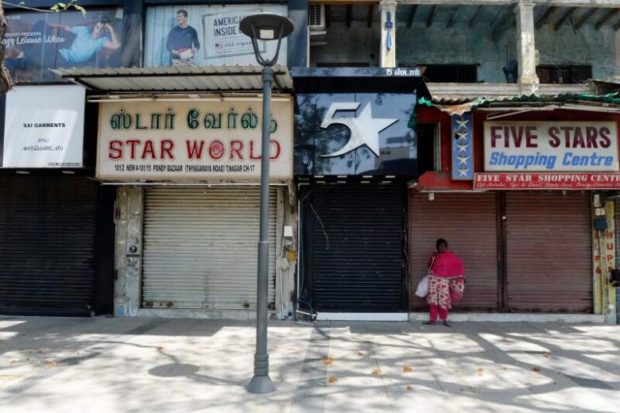
Chennai accounts for 70 per cent of cases in Tamil Nadu. AFP via The Straits Times/Asia News Network
BANGALORE — Chennai police were working overtime on the weekend after the city imposed an “intensified lockdown” from last Friday (June 19) to the end of June to deal with the rapid spread of the coronavirus.
Only pharmacies and hospitals are allowed to operate while offices, shops, markets, restaurants and even petrol stations were closed. Residents are banned from driving but can walk to nearby stores that open briefly in the morning.
Tamil Nadu has seen the third-highest number of Covid positive cases in India, following Maharashtra and Delhi. The 59,377 infections recorded by Monday means the southern state has almost as many cases as Delhi. Over 750 people have died. Chennai accounts for almost 70 per cent of the cases.
So even as the rest of India relaxes restrictions, Tamil Nadu announced a second, stricter lockdown for Chennai and neighboring Chengelpet, Kancheepuram and Tiruvallur districts.
The announcement of the new lockdown on June 15 prompted thousands of Chennai residents to drive to other districts. The rush saw long lines at highway check-posts and toll plazas until the wee hours of last Friday morning.
“We don’t want to risk catching coronavirus in Chennai. And we are sick of lockdown after lockdown. It doesn’t seem to have shown any benefits,” said Mr Naveen J. Antony, an accountant who drove out of Chennai last Wednesday with his family. They plan to stay in Coimbatore until the lockdown ends.
Chennai police commissioner A.K. Vishwanathan told a local paper: “We only allowed those with electronic travel passes to go through. We seized other vehicles or fined drivers. Most are staying home now.”
Other regions are now wary of travelers from Chennai.
Dr J. Nirmalson, the deputy director for health services in neighboring Salem district, said that of the 47 cases recorded on Sunday, six were Chennai returnees and four from other states.
Chennai city had 369 containment zones a week ago but it now has 64, while case numbers have exploded in suburbs like Tambaram and Pallavaram, which are entry points to the city. They are technically in the adjacent Chengalpet district, now also under lockdown.
Sunday saw a complete lockdown in Chennai and people stayed indoors, but the state still recorded the highest single-day spike with 2,532 new cases.
Health experts said the state known for its impressive health indicators is struggling with the pandemic because it has adopted a law-and-order approach with bans and fines rather than a more people-friendly public health policy.
Resident welfare associations complained that the door-to-door disease surveillance was inadequate and testing erratic. “I see more policemen out there than health workers,” said Adyar resident Ms Kavitha P.
A health department report in early June that found that hospitals did not report 236 deaths has also eroded public trust. With these deaths, Tamil Nadu’s fatality rate was 1.5 per cent compared with the 0.7 per cent reported by officials.
Tamil Nadu is testing 11,158 people per million, among the top 10 highest testing states. It also has 83 testing centers, the highest in the country.
But virologist Jacob John said the state was conducting more tests in areas with fewer cases. “If more people with symptoms and in hot spots are tested, more Covid-19 cases will be diagnosed,” added Dr John.
A frustrated police official, however, blamed people for flouting social distancing rules: “No one wears masks properly! Fifty of the 53 who died on Sunday had comorbidities. At least the elderly should be careful.”
State chief minister Edappadi K. Palaniswami launched a 300-bed institutional quarantine facility at a private college in Chennai on Sunday.
Calling the lockdown “a speed breaker”, Mr Palaniswami said: “God only knows when the pandemic will end.”